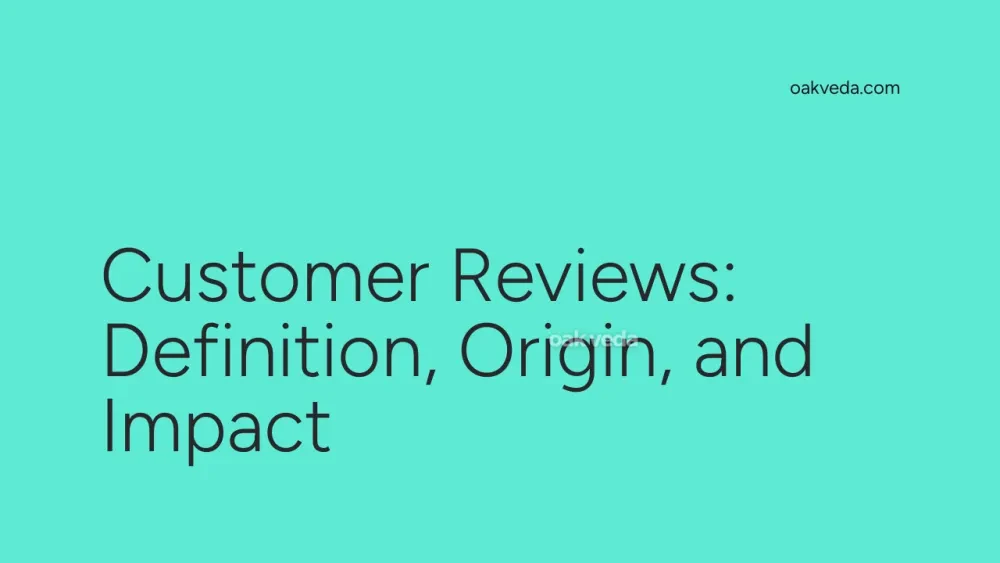
What are Customer Reviews?
Customer reviews are user-generated evaluations of products, services, or businesses shared on various platforms, including social media. These assessments typically include numerical ratings (often on a scale of 1 to 5 stars) and written comments detailing the customer's experience, satisfaction level, and overall opinion.
Origin and Development of Customer Reviews
The concept of customer reviews has existed long before the digital age, with word-of-mouth recommendations being a traditional form of consumer feedback. However, the rise of e-commerce and social media platforms in the early 2000s revolutionized how customers share their experiences.
Amazon.com was one of the pioneers in implementing online customer reviews in 1995. As social media platforms emerged, they quickly became hotspots for customers to voice their opinions, leading to the integration of review features on platforms like Facebook and Google My Business.
How Customer Reviews Work on Social Media
On social media, customer reviews can be collected and displayed in various ways:
-
Platform-specific review features: Many social media platforms, such as Facebook, have built-in review systems where customers can rate and comment on business pages.
-
Hashtags and mentions: Customers often share their experiences using brand-specific hashtags or by mentioning the company's social media handle.
-
User-generated content: Reviews can take the form of posts, stories, or even video content created by customers and shared on their personal profiles.
-
Third-party integration: Some businesses use third-party review platforms that can be integrated with their social media presence.
Types of Customer Reviews on Social Media
- Star ratings: Numerical evaluations, typically on a scale of 1 to 5 stars.
- Written testimonials: Detailed accounts of customer experiences.
- Video reviews: Customers sharing their opinions through video content.
- Photo reviews: Images showcasing products or services, often accompanied by captions.
- Influencer reviews: Opinions shared by social media influencers, which can have a significant impact due to their large followings.
Popular Examples of Customer Reviews on Social Media
- Facebook Recommendations: Users can recommend businesses and leave detailed reviews on their pages.
- Instagram Stories: Customers often share their experiences with products or services through Instagram's ephemeral content feature.
- Twitter feedback: Many customers use Twitter to publicly praise or criticize brands, often tagging the company's official account.
- YouTube unboxing and review videos: In-depth product reviews that have become a popular genre on the platform.
Impact of Customer Reviews on Social Media Culture
Customer reviews have significantly influenced social media culture by:
- Fostering transparency: Brands are now more accountable for their products and services.
- Empowering consumers: Social media gives customers a powerful voice to influence others' purchasing decisions.
- Shaping brand perception: Positive or negative reviews can quickly impact a company's reputation.
- Encouraging engagement: Reviews often spark conversations between customers and brands, as well as among consumers themselves.
Controversies Surrounding Customer Reviews
While customer reviews are generally beneficial, they're not without controversies:
- Fake reviews: Some businesses engage in creating false positive reviews or negative reviews of competitors.
- Review bombing: Coordinated efforts to leave multiple negative reviews, often for reasons unrelated to the product or service.
- Privacy concerns: Some customers worry about the personal information revealed in their reviews.
- Bias: Reviews can be skewed by factors such as free products given for review purposes.
How Brands and Influencers Use Customer Reviews
Brands leverage customer reviews on social media in several ways:
- Social proof: Sharing positive reviews to build trust with potential customers.
- Customer service: Responding to reviews to address concerns and show attentiveness.
- Product development: Using feedback to improve offerings.
- Marketing content: Incorporating reviews into advertising campaigns.
Influencers often use customer reviews to:
- Build credibility: Sharing honest reviews to maintain trust with their audience.
- Create content: Basing entire posts or videos on product reviews.
- Engage with followers: Asking for opinions and experiences from their audience.
Future Trends Related to Customer Reviews
- AI-powered review analysis: Advanced algorithms will help businesses gain deeper insights from reviews.
- Video reviews dominance: As video content grows in popularity, video reviews are likely to become more prevalent.
- Integration with augmented reality: AR technology may allow users to leave and view reviews in real-time as they interact with products or visit locations.
- Blockchain for authenticity: Blockchain technology could be used to verify the authenticity of reviews and combat fake feedback.
FAQs about Customer Reviews
-
How important are customer reviews for businesses? Customer reviews are crucial for building trust, improving online visibility, and influencing purchasing decisions.
-
Can businesses remove negative reviews on social media? Generally, businesses cannot remove negative reviews unless they violate platform guidelines. It's best to respond professionally and address concerns.
-
How can businesses encourage customers to leave reviews? Businesses can prompt customers through follow-up emails, social media posts, or by offering incentives (while adhering to platform policies).
-
Do customer reviews affect SEO? Yes, customer reviews can positively impact a business's search engine rankings, especially for local SEO.
-
How should businesses respond to negative reviews? Businesses should respond promptly, professionally, and empathetically, addressing the customer's concerns and offering solutions when possible.
Customer reviews on social media have become an integral part of the modern consumer experience. They provide valuable insights for both potential customers and businesses, shaping purchasing decisions and driving improvements in products and services. As social media continues to evolve, the role of customer reviews is likely to grow even more significant, making them an essential aspect of digital marketing and customer relationship management.
You may be interested in:
- Swiftie: Definition, Origin, and Impact on Fan Culture
- Rizz: Definition, Origin, and Impact on Social Media Culture
- Inbound Marketing: Definition, Origin, and Impact
- Sus: Definition, Origin, and Impact on Social Media
- CEO on Social Media: Definition, Origin, and Impact
- ISO: Definition, Origin, and Impact on Social Media

